Nearing the end of another long day of feeding everyone, getting them where they need to be, cleaning the house and organising a How To Train Your Dragon-themed birthday party for my eight-year-old daughter, I walked into our bedroom. There, on the floor next to – but not in – the laundry bin was a pair of socks and boxer shorts.
At that same moment I heard my six-year-old daughter shout, ‘Mama … I’m hungry’, just as the doorbell rang, the dog barked and my husband Jimmy shouted: ‘Can you get that? I’m in the loo!’ That’s when the rage I’d been holding in all week exploded.
There was shouting, slammed doors and a deluge of tears.
It wasn’t just rage; it was disappointment, loneliness and genuine hurt. I remember wishing Jimmy and the kids would all just disappear … so I could finally get my hands on the one thing I’d been craving all day. A glass (or bottle) of chilled white wine.
Most women will relate to the flash of white-hot resentment triggered by your husband asking where his keys are, dirty plates piled on the counter above the dishwasher and the fact that no one, not one person, ever acknowledges all you do – let alone thanks you for it.
I call these seemingly small, yet constant, domestic and bureaucratic tasks the ‘mental load’. You can never complete them, perfection is impossible but widely expected and being overwhelmed is an unavoidable side-effect.
Pour alcohol – and indeed alcohol addiction – on top of all the resulting pent-up frustrations and you have a recipe for a marital and mental Molotov cocktail. And I should know.
At my worst, I would drink at least a bottle of wine a night. I’d take a night or two off a week because, if I was able to do that, then I wasn’t an alcoholic, right? I may not have been drinking 24/7 but I was thinking about drinking 24/7. And when I went out drinking with friends, I never knew where I was going to end up or what was going to happen.
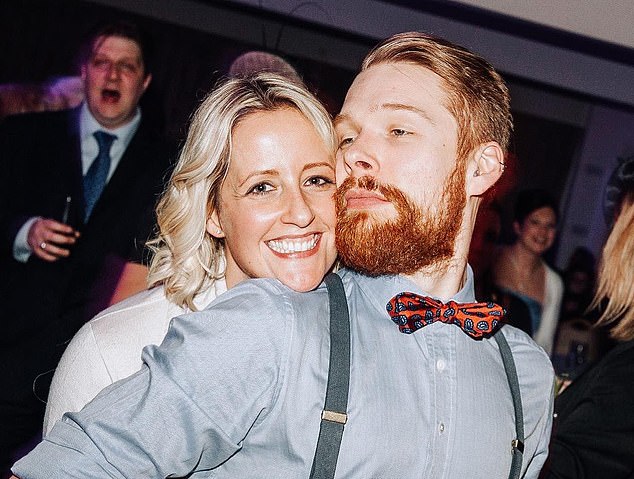
Jimmy’s life as a touring musician fuelled Cat’s sense of isolation – and her drinking
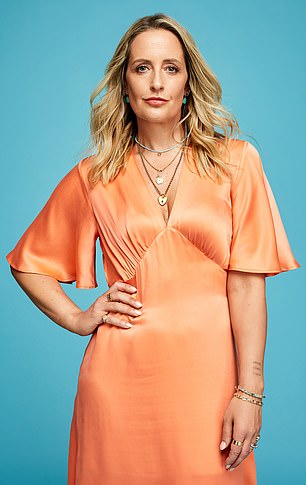
Cat decided that divorce was the solution
By 40, I was burnt out, broken down and seconds away from blowing up my marriage – because instead of dealing with the things that made me resentful and rageful, I drank. A lot.
Like many people, I’d loved a drink in my late teens and 20s. I met Jimmy in a bar when I was 25 and working as a teacher. Within five months, I’d moved from Yorkshire to London to be with him and four years later we were married.
Even in those early days, it was me who organised our social calendars, did the laundry, cleaned the house, bought Christmas presents for our respective families, ensured he sent a Mother’s Day card and booked our holidays.
I’d be lying if I said I didn’t feel a twinge of resentment, but we were trapped in a cycle of pretending everything was fine until we’d have a big argument, before making up and starting the whole process all over again.
We went on to have two daughters, now 11 and nine. First time round, I had a traumatic birth and struggled with breastfeeding. It was excruciatingly painful and I had mastitis four times in ten weeks.
I’d physically shake every time my baby woke up because I knew I’d have to feed her. I desperately wanted to stop breastfeeding, but everyone told me it was best for the baby, so I kept going. My daughter was nine weeks when I finally gave in, sobbing to the health visitor: ‘I’ve just given my baby some formula and I need you to tell me I’m not a terrible mother.’
‘Don’t worry, lovey,’ she replied. ‘You can always try to undo the damage you’ve done when it comes to weaning.’
Damage? That was it – my maternal rock bottom. In my mind, that health visitor had confirmed I was a terrible mother and a useless human. After that, post-natal depression swamped my first year of motherhood.
As a touring musician, Jimmy was away for seven months of that year and we had no family around. It breaks my heart to say this but the first year of my eldest’s life was the worst year of mine.
Sleep-deprived, with little self-worth, I felt isolated and very lonely. So, I drank.
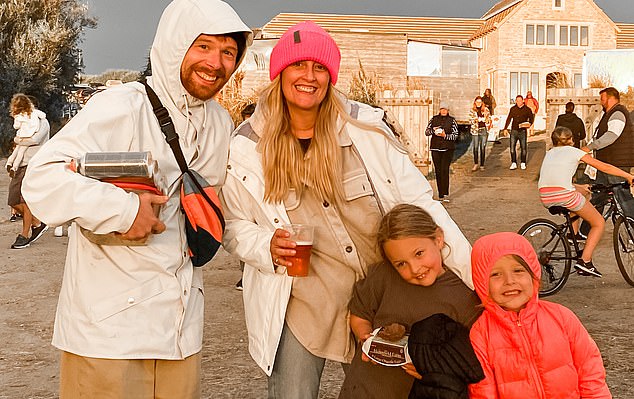
Cat enjoys a day out with Jimmy and the children – with a drink in hand
As I changed nappies, cleaned the kitchen and tidied toys on repeat, I’d fantasise about that first glass of wine. As I sat in church halls singing The Wheels On The Bus, I’d eye up the other parents, trying to pick out who looked like they’d be up for a ‘Prosecco playdate’.
Every evening, as soon as the baby was asleep, I’d crack open a bottle; a reward for putting everyone and everything else first all day. The first glass went down quickly and by the time I’d finished the second, I’d tell myself it wasn’t worth saving what was left, so finished off the bottle. Often within an hour.
By the time my second daughter arrived in 2016, I was a functioning alcoholic. Even though I cut down during pregnancy, I must admit I still drank more than any doctor would have advised, which is a source of huge guilt.
Whenever my husband returned from a tour, it never occurred to me he might want to spend time with me. Instead I bolted out the door to meet friends for a big night out. I’d tell my husband I wouldn’t be late, but before I knew it, it was 4am and I couldn’t get a taxi.
I’d lie and tell him I hadn’t done any cocaine, even though it was obvious to anyone with eyes that I had. And the reason I’d started taking cocaine? I discovered it allowed me to drink more, and for longer, without blacking out.
Of course, the subsequent hangover meant I would be incapable of lifting my head off the pillow the next morning, let alone looking after children. If I’m honest, I definitely preferred lying in bed with a death-defying hangover than doing yet another day of mum-life.
I’m flooded with shame when I think about the many times I was the only adult in the house, solely responsible for my children, and yet drunk.
At the same time, our marriage started to crack. We didn’t have the time, space or energy to acknowledge it out loud, but little by little, our paths diverged. We lived in the same house, looked after the same children but emotionally we were poles apart.
It didn’t help that Jimmy was away so much the girls viewed him as a novelty when he was home. He took up the role of ‘Disney Dad’; he didn’t want to get into a battle about whether or not they should wash their hair, or pick up their toys. He just wanted to take them to the park, read stories, play with them and buy them ice creams with two flakes.
Meanwhile, I’d be Bad Mummy who made them eat their greens. Yes, he was entertaining the kids, but he wasn’t helping with the boring, tedious, never-ending tasks that need doing over and over again. Hell, he didn’t even see those things or know they existed.
I realised I felt lonelier when my husband was home than when he was away. My drinking always increased with him around.
And he couldn’t understand why I was so joyless. After all, he was helping, he was taking the kids off my hands. Wasn’t this what I’d been desperate for while he was away?
My feelings only burst forth when I couldn’t take it any more. Usually after finding yet another sock dropped on the stairs. To him, I was over-reacting. It was, after all, just a sock. To me, though, it was the sock that broke the camel’s back.
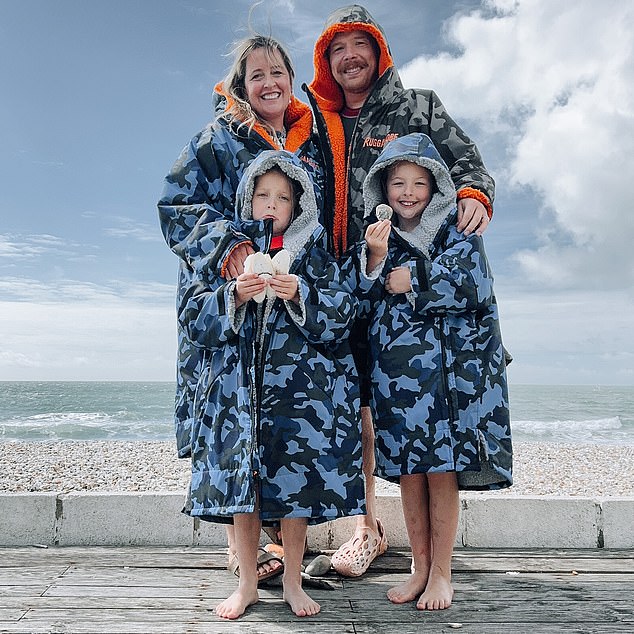
Cat and Jimmy now make sure they divide the menial tasks to lessen her burden
At night, I’d stay up later than Jimmy, pretending I had laundry to do, or work to finish. The real reason was because I wanted to pour myself another glass of wine, maybe even open another bottle, without Jimmy’s disapproving eye on me.
Though he complained about my benders with friends, saying it wasn’t normal for a mother of two to behave like that, he never mentioned my drinking at home. Then again, we were both fluent in passive aggression.
In 2018, after seven years of marriage, I couldn’t take it any more. I sat Jimmy down and told him we were separating. Just like that. At this point, we’d tried couple’s therapy, but his touring schedule meant we couldn’t stick to consistent appointments and I was pretty disengaged anyway.
By the time I dropped the bombshell, I’d found a flat down the road that we could rent for three months. I’d even put down a deposit. I told Jimmy it was perfect because the kids would stay in the house and we would move in and out depending on whose turn it was to be with them. I was proud of my logistical skills, and I thought he would be too. He was blindsided. He genuinely couldn’t believe I was suggesting we end our marriage. He admitted things had been tough but said he’d never wavered in his love for me and definitely didn’t want to separate. Now it was my turn to be blindsided.
Sure, there had been no affairs, betrayals, violence, or unkindness, at least not in the obvious sense. But every time my husband lacked the effort to look for something himself, change a bed, clean a bathroom or buy a birthday present for his own bloody mother, it felt like an act of unkindness.
When there was no thanks or recognition for every magical Christmas, or memory-making birthday party, it felt like a betrayal. And, slowly but surely, over the years I felt my love for him erode – and what took root in its place was resentment that thrived like Japanese knotweed in my soul.
But, in my efforts to end our marriage, I’d inadvertently created space for us to address the marital elephant in the room. He asked me to try couple’s therapy again. I reluctantly agreed to go back the next day.
As a northerner brought up to pull myself together, talking about my feelings honestly felt alien and shameful. Jimmy was much more comfortable with the process.
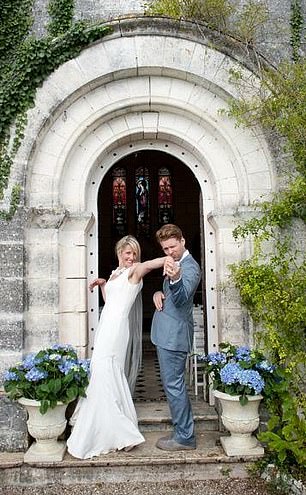
The couple on their wedding day
My drinking came up in therapy sessions but no one used the word ‘alcoholic’. It was always within the context of being a ‘party girl’. But the seed was planted.
It took a long time to rebuild our relationship. For the first eight weeks, Jimmy and I were able to put on a good impression of two happy parents when the kids were around, but as soon as they weren’t we’d repel each other like magnets. And, while the voice in my head telling me I was an alcoholic was growing louder, I was still drinking.
Eventually, though, we made breakthroughs. I learned how to open up and be vulnerable in front of Jimmy. I realised that although most of my feelings around the mental load – feeling unappreciated, unseen, unsupported – were valid, the way I was expressing them was not.
I started to see that even if Jimmy did try to help, it was often still not good enough for me. I needed to focus on what I was feeling and stop obsessing about how I could make it his fault.
It wasn’t easy to get into the habit of monitoring my own behaviour and mistakes instead of Jimmy’s, but it worked. I became more tolerant, softer, open and let him join my team as the second adult in our family.
A couple of years later, in November 2021, I went into recovery and got sober. It’s a common misconception that addicts have one rock-bottom that finally brings them into sobriety. In my experience, addicts have many rock-bottoms and, eventually, we decide we’ve hit the last one we’re prepared to endure.
In my case, it was a panic attack at 4am – the kind where you think you’re dying of a heart attack – that made me realise I couldn’t continue to live this way. My life had become unmanageable and I knew, on a cellular level, that it was all because of my drinking.
Jimmy was supportive, attending the first meetings with me.
Giving up alcohol initially wasn’t difficult. By then, I had the gift of desperation; I knew if I carried on drinking I’d lose my marriage, my children and maybe even my life.
Learning to live without it in the long-term was harder. I couldn’t just pour wine on sadness and anger to make them go away. I had to figure out why I felt like that and take steps to make myself feel better again. Sometimes that meant just being patient, accepting it’d take time. Sometimes it meant accepting I’d done something that required an apology.
Today, almost four years on, I can’t imagine picking up an alcoholic drink or touching cocaine ever again. It’s amazing how much marital ‘drama’ disappears when you’re sober. These days we rarely fight and, if we do, we apologise quickly.
Jimmy doesn’t tour as much and there’s no doubt him being around more helps. Sure, even in sobriety, the mental load is a behemoth that lives in my brain rent-free. But now it’s got itself a pied-à-terre in my husband’s brain, too.
These days Jimmy does most of the pick-ups and drop-offs, along with all the cooking and shopping. I’m still the one who writes the to-do list, but now I put my initials by the jobs I’m going to do and he takes responsibility for the rest.
We have a ‘meeting’ every morning, where we figure out who’s taking responsibility for the cleaning, the children, our jobs, or a date night. It might not sound sexy but it’s how we find the best way to support each other. And when you feel supported and kept in mind, well, that really is sexy.
Also, it’s easier to ‘adult’ successfully when you’re not cripplingly hungover. Funny that.
- Cat Sims is the author of The Mental Load Diaries (Gallery Books, £16.99) out now. Follow her at @notsosmugnow












